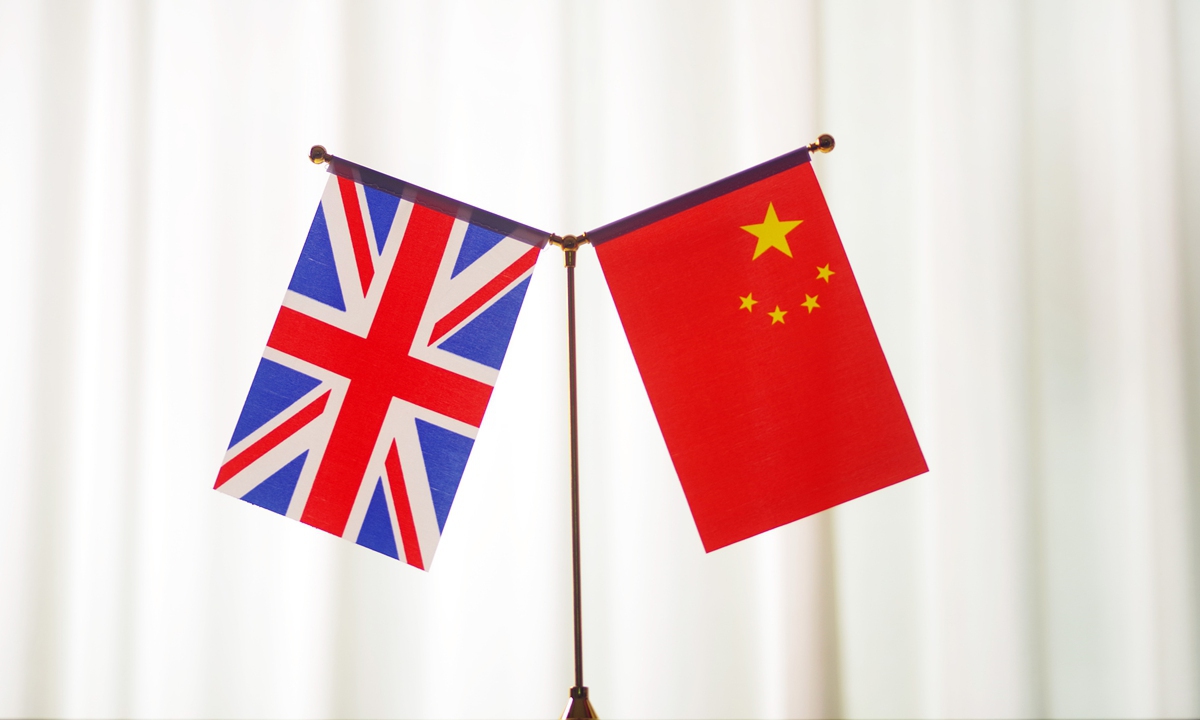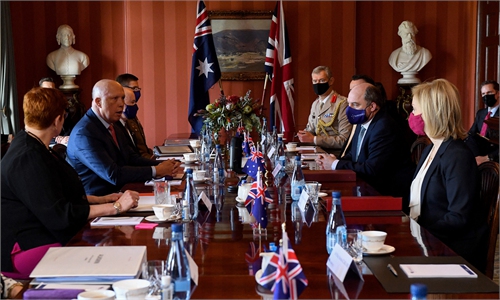
China UK Photo: VCG
The UK government's China policy, at least in economic and trade areas, seems to have taken a fresh turn, with Prime Minister Boris Johnson reportedly seeking closer economic ties with China by restarting trade talks.
But the new development has seen a cabinet split over UK-China relations, as some cabinet members like Foreign Minister Liz Truss believe a tougher stance toward Beijing is more in line with the country's security needs, the Independent reported on Sunday.
The competing views among British officials on the country's approach toward China also highlighted a contradictory position for the UK, where it faces mounting pressure to pursue foreign policy based on Western ideological bias toward China as well as increasingly urgent needs for economic development that call for pragmatic cooperation with the world's second-largest economy.
Given the UK's "special relationship" with the US, it is not surprising to see some British politicians are engaged in selling the "China threat" theory in keeping with the US' ever-widening containment approach, even though they have failed explain how exactly China poses a security threat to the UK with the two countries so far apart.
In fact, the "China threat" theory has been cooked up on the basis of Western ideological bias toward China and false judgments, which underlines the West's unwillingness to accept China's rise in terms of economic strength through hard work and policy decisions.
While London appears to have lost its rationality and political wisdom as a strategic power by betting its fate entirely on the "special relationship" with the US, its need for pragmatic economic cooperation with China is also becoming increasingly urgent, as the country faces multiple economic challenges after Brexit and amid the COVID-19 pandemic.
Statistics from Chinese customs reveal that bilateral trade between China and the UK jumped 21.9 percent in 2021, still a relatively fast pace. This is probably the fundamental reason why there are still voices in the UK pushing for pragmatic cooperation with China.
In fact, despite bilateral diplomatic tensions on a series of issues, some in the UK have gradually come to realize that the US alone cannot lift the UK economy from its current predicament exacerbated by Brexit and the COVID-19 pandemic, while stronger economic ties with China will not only mean getting a helping hand, but also put the UK in a more favorable strategic position.
Several days ago, China's Hualong One, a domestically designed third-generation nuclear reactor, was authorized for use by the UK's nuclear regulators. It was no secret that the US had tried to pressure Britain in blocking Chinese companies from participating in its nuclear power projects, but the growing urgency of Britain's need to address its nuclear power development problem and its energy crisis ultimately prevailed.
China's Hualong One has fully independent intellectual property rights based on over 30 years of experience in nuclear power design, manufacturing and operation, a vivid manifestation of China's new heights in terms of technological progress. Such technological development should be conducive to cooperation between China and Western countries like the UK, and should not be the reason why Western countries decide to cut off their cooperation with China, which would only undermine their own economic development momentum.
Take the UK's banning Huawei's 5G as an example. The UK has to pay a high price for replacing Huawei's equipment and purchase more expensive products and services from other suppliers. Even worse, the construction of the UK's entire 5G network will be delayed for years, causing negative impact on the country's technological development and even costing the future of relevant industries. Such loss is incalculable.
As media reports suggest, some UK officials are starting to realize that. However, instead of contemplating, the UK needs to adhere to its long-standing pragmatic foreign policy and take concrete actions to pursue pragmatic cooperation with other countries, including China, instead of confrontation. Mindlessly following the US into ideology-led diplomacy would only bring massive loss for the UK.


